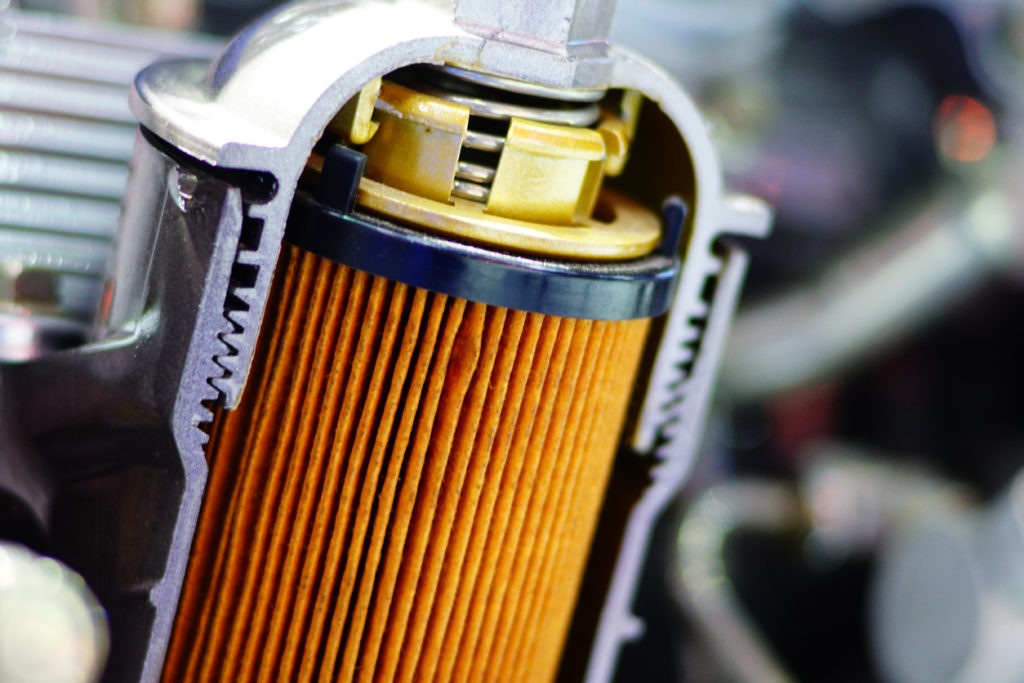Lubricating oil has several fundamental functions for maintaining the good functional status of engines and industrial machines. To ensure that they have good durability, it is also essential to take care of the oil filter and its maintenance.
In the case of industry, filtration can be part of the production process or of environmental management as an effluent treatment stage. Find out in the article, below, what they are and how important this equipment is for maintenance.
What is an oil filter?
An oil filter is a porous, fibrous or granular device whose function is to remove impurities or solid particles from a fluid, when it passes through it through adefiltration process.
The Filtration Theory says that the filtration capacity of a material will depend on the pressure of the fluid over the area of the filter material, its resistance to the passage of the fluid and the resistance of the waste generated (cake).
Filters can be categorized according to the replacement element intosimple, surface (membranes or analytical filter paper) ordepth (paper or fabric folded in several). Let’s see:
- Simple: protect the pump and hydraulic circuits from larger particles, being installed in the flow direction, in a position before the pump. The filtration in this case is coarse, with low restriction and free flow.
- Depth: compounds of fabrics such as tow, cotton and felt or cellulose fibers and with a permeability scale between 10 and 50 microns, perform good filtration, also absorbing water and resins.
- Surface: made of paper or fabric impregnated with resin, have a permeability scale between 2 and 40 microns on the permeability scale, that is, limited porosity. Therefore, they are used in large surface areas, such as pleated paper filter elements. The filtration in this case is of low restriction, fine and has free flow.
In this way, the filters are classified according to thefilter material composition, which can be porous, fibrous or granular, and also according to thetypes of support, that is, bags, cartridges, capsules and discs.
The general principle of filtration is always the same, however, the shape of filtration systems varies depending on the case. The efficiency of the filter is given by beta ratio of the filter.
How to choose the right filter?
In addition to the Simple, Depth and Surface filter types, it is possible to control contamination levels by filtration magneticor yetcentrifuge. The first technique uses electromagnets to attract and collect ferrous particles while the oil flows through a magnetic region. On the other hand, centrifugal filtration integrates the rapid rotation of a cylinder in order to produce a centrifugal force that separates the particles from the oil.
It is also possible to classify the filtration systems according to the type of oil flow inside: total flow andindependent circuit. In the first case, the filtration systems pump the entire volume of oil into the filter, retaining almost all of the larger particles. As for the independent circuit, the pumping and the filter are separated, so that the pressure and flow in that system do not depend on the main hydraulic circuit.
As for the independent circuit, the pumping and the filter are separated, so that the pressure and flow in that system do not depend on the main hydraulic circuit. This arrangement allows operations not to be interrupted if there is a need to change one of the equipment.
The choice of the filter will depend on its purpose. However, the most important characteristics when choosing these elements are:
- Specific resistance of the porous filtration medium
- Volume of oil to be filtered
- Degree of contamination
- Easy maintenance, cleaning and removal of the cake
- Granulometry
What is the purpose of the oil filter
The essential purpose of the oil filter is to remove destructive contaminants that, for some reason, have mixed with the fluid during the use of the equipment. It is also possible that these particles originated from chemical reactions inherent to the oil itself or due to wear on the equipment, such as metallic particles or soot. Filters are combined to create filtration systems, which will be prepared according to your company’s profile.
In industries, systems are often used moresolid – liquid (separation of fluid from a solid – cake) andsolid – gas (removal of solid particles from the air). The first separates solid particles from a liquid element, as in the case of juices in the food industry, lubricating oils or fuels or even in the treatment of effluents generated at some stage of the production process.
In turn, solid-gas filters are widely used in factory chimneys, with the aim of reducing the emission of particulate matter to atmospheric air.
Why is it necessary to install the oil filter?
In addition to increasing equipment life, the oil filtration system is decisive for theconfiabilidade of any hydraulic installation, which ultimately depends on the cleanliness of the system. This is to say that the quality of both machines, engines and equipment as well as the final products will depend on filtration.
Fundamentally, oil filters must be capable of retaining all contaminants that may cause damage, failures or breakdowns in the engine or equipment while maintaining the structural characteristics of the oil, as well as the uniformity of its circulation inside the machine and efficiency while in use.
For this reason, it is very important that filters and filtration systems are designed with the production objective in mind. The cost-benefit ratio, the performance of the filter, ease of use and maintenance, environmental standards and the environmental management system adopted by your company must also be taken into account.
In addition, following the filter change recommendations offered by manufacturers in the instruction manuals is essential.
What happens if the filtering doesn’t work correctly?
As seen, the function of the filters is to prevent the accumulation of impurities, such as metal particles from the wear of the machine or the engine or residues such as soot.
Such impurities, once in contact with the internal parts of the machine or engine (bearings, valves, cylinders, rings and pistons), cause damage, which, depending on the severity, can be irreversible or even cause work accidents.
In this way, we can see that the filters are as diverse as the equipment on which they will be installed. It is important to check what type of filter is needed, as the efficiency of this will depend on the purpose. The main purpose of the filter is to keep the oil clean, increasing the life of the equipment and preventing wear that can even cause work accidents.
Go a little deeper into the importance of filters by learning about thedifference between filtration and microfiltration




